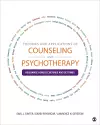
Theories and Applications of Counseling and Psychotherapy
3 authors - Paperback
£158.00
Earl J. Ginter, Ph.D., LMFT, LPC is Professor Emeritus at The University of Georgia. Earlier in his career he worked at Nicholls State University as a counselor, teacher, and researcher. He also has over 38 years of experience working as a private practitioner. Before he retired on April 1, 2016 he served as the Director for the Division of Academic Enhancement at The University of Georgia. This academic unit worked with approximately 10,000 undergraduate, graduate, and international students each year offering them an array of skill-building services, academic courses which were designed to meet students’ academic concerns, and counseling services which included treating dissertation anxiety. Ginter was also responsible for managing the Division’s four federally funded TRiO programs for low-income and first-generation students, operation of the Division’s Learning Center, peer tutoring program, satellite and outreach services, and a special program developed to increase retention and graduation rates at the University. The special retention/graduation program was utilized by 10 academic schools/colleges at The University of Georgia. Other professional experiences include having served as the editor for both the Journal of Mental Health Counseling and the Journal of Counseling & Development. The latter journal is the flagship journal of the American Counseling Association with approximately 55,000 subscribers. In addition, he served as the Contributing Editor for National Association of Rehabilitation Professionals in the Private Sector and the Associate Editor of the theory section of the Journal of Mental Health Counseling. Ginter has authored or coauthored numerous publications including journal articles, monographs, book chapters, and books, e.g., Group Counseling and Group Psychotherapy: Theory and Application by George M. Gazda, Earl J. Ginter, and Arthur M. Horne. Ginter’s publications have focused on issues that comprise the theoretical and practice aspects of counseling and marriage and family therapy. His research and assessment interests pertain to the application of developmental-based approaches to working with individuals, couples, families, and groups. Gargi Roysircar received her doctorate in educational psychology with emphasis in counseling psychology at Texas Tech University. She is the Founding Director of the Antioch Multicultural Center for Research and Practice at Antioch University New England and Professor of Clinical Psychology. She conducts research on disaster outreach in international settings, the effects of acculturation and enculturation on immigrant mental health, multicultural competencies in practice and assessment, and training graduate students in culturally informed practice. She has authored over 100 journal articles and chapters on these topics, with her most recent publications in Traumatology, Counselling Psychology Quarterly, Professional Psychology: Research and Practice, The Journal of Black Psychology, Journal of Muslim Mental Health, Journal of Career Development, and The Oxford Handbook of Social Class in Counseling. Dr. Roysircar has participated in mental health counseling in earthquake-destroyed Haiti, tsunami-affected fishing communities in Southern India; Hurricanes Katrina and Rita-affected communities and first responders in the United States Gulf Coast; and in Southern African orphanages that serve HIV/AIDS-infected and affected children and women. She has provided psychoeducation in flood-ravaged Villahermosa, Tabasco, Mexico. Dr. Roysircar trains her counseling teams in disaster trauma, culture-centered skills specific to a community disaster, and in clinician self-care and resilience. She is a grantee of the American Psychological Foundation for her research on her disaster mental health assessment and services. In 2001, Dr. Roysircar was elected as the first Asian President of the Association for Multicultural Counseling and Development, and was appointed as the first Asian editor of the Journal of Multicultural Counseling and Development from 2004-2011. Her awards include the 2002 Extended Research Award of the American Counseling Association (ACA) as well as ACA’s 2007 Research Award. Her co-authored books are “Multicultural Assessment in Counseling and Clinical Psychology,” “Handbook of Social Justice in Counseling Psychology,”\ and the Spanish translation of “Multicultural Counseling Competencies (2003),” having previously co-authored this book in English. Her instrument, the Multicultural Counseling Inventory (MCI), is the most frequently cited instrument among published self-report multicultural competency scales. Her article (Sodowsky et al., 1998), which uses the MCI instrument, was ranked over the past decades among 25 most cited articles of the Journal of Counseling Psychology. Dr. Roysircar is ranked in productivity ratings of authors in 5 multicultural psychology journals. She is a Fellow of the American Psychological (APA) and served on the APA Taskforce for Re-envisioning the Multicultural Guidelines for the 21 Century, adopted by APA in August 2017 and entitled as, Multicultural guidelines: An ecological approach to context, identity, and intersectionality. Dr. Roysircar was the recipient of the 2017 Division 35 Psychology of Women Strickland Daniel Mentoring Award. Dr. Roysircar’s 44-year teaching career has been spent in three countries across three continents. Lawrence H. Gerstein earned a B.B.A. in public administration and a Ph.D. in counseling and social psychology. He is a Ball State University George and Frances Ball Distinguished Professor of Psychology and Director of the Center for Peace and Conflict Studies, Fulbright Scholar, and a Fellow of the American Psychological Association. Professor Gerstein is a Co-Editor of the Journal for Social Action in Counseling and Psychology and an Editorial Board Member for the Journal of Counseling Psychology. He has published 100+ scholarly articles and three books including the International Handbook of Cross-Cultural Counseling and the Handbook for Social Justice in Counseling Psychology. He is known for his research on cross-cultural methodology, nonviolence, social justice, emotions, and sports for youth development. Professor Gerstein has received 2+ million dollars in funding including four U.S. State Department grants and one U.S. Institute of Peace grant. He has performed conflict prevention and resolution work and/or research with adults, children, and youth in the U.S.A, Jordan, Pakistan, Tajikistan, China, Hong Kong, Korea, Indonesia, Israel, Taiwan, and Burma. He also has trained Iraqi young leaders in social entrepreneurship.